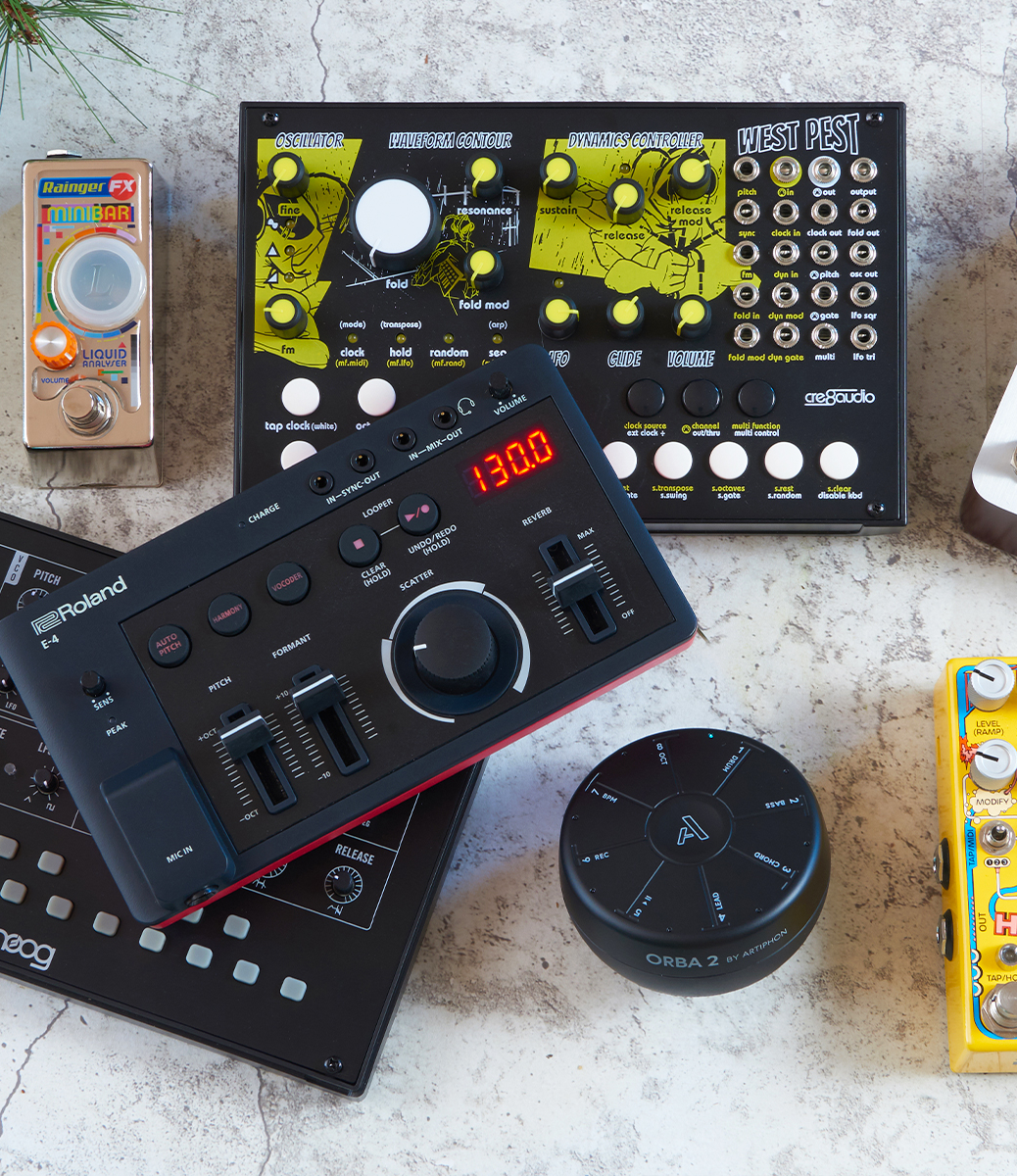Everyone needs a hobby, right? And chances are you know at least one person on your holiday shopping list who fancies themselves a musician. Whether they’re a casual guitarist, a former piano prodigy or a bedroom producer of electronic music we’ve got some recommendations. Some of these even make a great gift for music lovers who haven’t quite made the jump yet. Perhaps getting a synthesizer tinker toy will inspire your loved one to go from a consumer to a maker.
If you know someone who believes there’s music all around, if you can just train yourself to listen for it, I have the perfect gift for them. The Soma Labs Ether is sort of like a microphone. But not one that you sing into. Instead, it picks up electromagnetic interference and radiation from across the entire spectrum from Hertz to Gigahertz. Soma likes to refer to it as an anti-radio since it doesn’t tune into one frequency, it tunes into all the frequencies. With the Ether your sound-loving giftee can eavesdrop on neon signs and sample the silent whine of an AC adapter. It’s literally a gateway to an invisible world of electromagnetic waves. And the particularly adventurous can even wield it as a live instrument.
Modular synthesis has been enjoying a revival over the past few years. But getting into Eurorack can be intimidating and very expensive. So a number of companies have been working to lower the barrier to entry. If there’s someone on your list that has been itching to dip their toes in, the West Pest and East Beast from Cre8audio are an excellent starting point. They’re self-contained semi-modular synths, so they don’t need any extra gear to start experimenting. But they’re Eurorack compatible, and can be removed from their cases and mounted in a larger system if they wind up going deeper down that rabbit hole.
We like the West Pest in particular because, in addition to being perhaps the most affordable Eurorack compatible semi-modular synth out there, it explores the more experimental world of west coast synthesis. As the music gear experts at Reverb note “the combination of Wavefolding with the Dynamics Controller (a take on the low-pass gate) gives the synth its bold, unique and adventurous sound.”
Every music lover and music maker needs a good pair of headphones. There are so many amazing sets out there to choose from, but I remain a dedicated fan of Sony’s affordable workhorse the MDR-7506. They’ve been a studio mainstay for decades for good reason. They’re natural sounding, light and comfortable enough to wear for hours, and reasonably priced. The MDR-7506s are equally at home monitoring a podcast, mixing a club banger or just listening to some vinyl. In short, they’re a great practical gift even if you’re operating under a tight budget.
The original Orba is a phenomenal fidget toy and an interesting MIDI controller. The Orba 2 is both those things and a sampler. Adding sampling to this little musical grapefruit greatly expands its flexibility. If you know someone who’s constantly tapping out rhythms or humming little melodies to themselves, they’ll probably love an Orba.
Cheap and portable synths are a dime a dozen these days. Korg really kicked off something of revolution with its Volca line. But one thing we’d yet to see until Roland launched its Aira Compact line, was a portable and affordable box dedicated to vocal effects. The E-4 Voice Tweaker combines pitch correction, a harmonizer, a vocoder, plus pitch and formant shifting, and a looper. There’s also delay, reverb and chorus effects, not to mention Roland’s signature Scatter, which it turns out is much better on vocals than drums. If there’s anyone on your list who’s been trying to turn themselves into the next Bon Iver or late ‘70s Herbie Hancock, this will at least get them part of the way there.
Where to begin with the Habit? It’s a delay pedal – which almost every musician can use. But it’s so much more. It’s a looper, sort of. Chase Bliss calls it a musical sketchpad, and that can be true too. It does all of those things, plus it has a selection of unique modifiers that can chop up sounds in rhythmic ways, mimic the warble of a tape machine, or spit out what can only be described as unicorn sparkles. In short, there’s almost nothing else like it out there. If there’s a guitarist or a synth player on your list with a taste for the esoteric (and you don’t mind splurging), they’ll probably love the strange collection of sounds that Habit puts at their feet.
The 1010Music Nanoboxes are probably the smallest full-featured hardware synths out there. But the Lemon Drop also has the distinction of being one of the only dedicated granular synths on the market. If your giftee is into ambient music or oddball textures they will almost certainly love the Lemon Drop. It has a robust granular sound engine (meaning it chops up sound files into tiny bits and spits them back out) with up to 16 granulators per voice and four voice polyphony. Plus it doubles as an effects processor for live audio with an expressive X/Y pad mode for changing parameters. And it can easily fit in a jacket pocket.
The Mavis is the cheapest way to give someone the gift of a real-deal Moog synthesizer. It’s a $350, pseudo-DIY, semi-modular, monophonic synth and, in a rarity for the company, it’s fully Eurorack compatible. It’s capable of getting that classic Moog sound with thick square and saw waves shaped by resonant lowpass filter. Its 24-point patchbay is an impressive collection of utility and sound-shaping tools that is not only great for learning the art of synthesis but also expanding the potential of a larger modular setup. Lastly, the Mavis is the first time Moog has dipped its toes into the rival world of West Coast synthesis by including a wavefolder. It’s a great gift whether it’s someone’s first synth of fiftieth.
Part of the fun of holiday shopping is finding fun weird things that you know someone would appreciate, but are so impractical they’d never buy it themselves. That’s basically the Rainger FX Minibar in a nutshell. It’s a distortion pedal, and also an endless supply of different distortion pedals. See, on its own it doesn’t do anything. The “Liquid Analyzer” part of the name comes from the fact that there’s a tiny container on top that you need to fill to complete the circuit. And, the sound will change based on what you put in there. Water will have an obviously different effect than say, beer, or soda, or – if you’re metal enough – blood. The folks at Reverb love it because “the Minibar is easy to incorporate into musicians’ small pedalboards… meaning folks can experiment without too much of a space commitment.”
I firmly believe that every guitarist should have an amp sim in their arsenal. They’re handy for quietly practicing late at night, recording direct to a DAW, or building a lightweight live rig that connects to a venue’s PA. Universal Audio’s are among the best amp sims I’ve ever used. They’re not cheap at $400, but if there’s a person on your list you want to splurge on, these are a worthy consideration. While all three of the models are excellent, and my personal favorite seems to change from week to week, it’s probably the Ruby ‘63 Top Boost that has spent the most time on my board.
The Ruby is an emulation of the classic Vox AC30 which has been used by everyone from the Beatles, to U2, to REM, to Queen. Reverb’s experts love that it “delivers choirboy cleans, complex overdrive, and classic vibrato to mimic a classic British tube amp.” Plus you can tweak the Ruby’s sound by turning on popular mods or switching in different speaker emulations.
The Century Collection is another splurge, but it’s the gift that keeps on giving. For $400 your giftee will receive every sample pack, virtual instrument and effect plugin that Puremagnetik makes for the next 100 years. On day one they’ll get access to around 100 sample packs covering everything from vintage synth pads, to circuit bent toys, to early digital drum machines.
But perhaps even more interesting are the 39 VST plugins that range from lo-fi keys to absolutely out of this world effects. The creative delays and strange micro loopers are highlights and perfect for the person who’s into more ambient and experimental music. Then there’s Lore, an “advanced sound design workstation” that’s updated on a monthly basis with new features and effects. Even if someone manages to outlive the length of their Century Collection membership, they’ll probably never be able to fully explore it all.
Anyone who practices some sort of creative art – be it music, painting or writing – hits a block at some point. There’s tons of advice out there on how to overcome these hurdles, but one of the most famous is easily the Oblique Strategies deck. Developed by Peter Schmidt and Brian Eno in 1975, each card contains an action or a way of thinking designed to shake up your approach to a thorny creative problem. “Use an unacceptable colour,” “Make a sudden, destructive unpredictable action; incorporate” and “Emphasize the flaws,” are the sorts of vague instructions you can expect. And how someone interprets the prompts will produce different results for each person. If you’re shopping for anyone with a creative streak, they’ll find a use for this deck.
If you’re gift shopping for a music producer I can almost guarantee you they’re fans of J Dilla. He was a singular force in hip-hop, and has even had his MPC displayed at the Smithsonian. Dilla Time by Dan Charnas chronicles not just the life of Dilla (James DeWitt Yancey), but his legacy and the history of rhythm in America. In addition, there are graphics that help illustrate the concepts behind Dilla’s unique beats and what made him so special. It’s part biography, part history lesson and part practical music production guide.
If there’s an aspiring songwriter on your list, consider picking them up a copy of How to Write One Song. Written by Jeff Tweedy of Wilco, this tome breaks down the process from beginning to end and encourages readers to start small; don’t try to become a “songwriter” just try to write a song. But this isn’t a rote how-to book, that sort of thing is only so helpful when it comes to mastering an artistic craft. It’s about building creativity into your everyday life. And just like any other skill, being creative requires practice.
A turntable is almost a necessity for any music lover or music maker. For one, it’s a way to listen to the artists they love. Whether that’s for pure enjoyment or for inspiration. And while there are plenty who think that vinyl just “sounds better,” I think the real reason it beats out streaming from Spotify: It’s tangible. There’s nothing quite like physically holding a piece of music, placing the needle in a groove and looking at the large cover art, or reading the liner notes. It connects a person to the art more and forces them to be a more active participant in its consumption.
Now, the AT-LP120XUSB is not the highest-end turntable in the world. And it might not even be the best bang for your gift-giving dollar. But it is excellent sounding and reasonably priced. And the USB port makes it easy for any aspiring music producers to sample straight to their DAW. Maybe, just maybe, it will inspire a life-long love of crate digging.
More Holiday Gift Ideas: Check out the rest of our tech gift ideas right here. Also, you’ll find the best ideas for car lovers at Autoblog, gifts for the young (and young at heart) at In the Know, and picks for just about everyone else on your list (moms, dads, teens, nurses, you name it!) in Yahoo’s holiday gift ideas section.
Subscribe to our two newsletters:
– A weekly roundup of our favorite tech deals
– A daily dose of the news you need
Please enter a valid email address
Please select a newsletter













